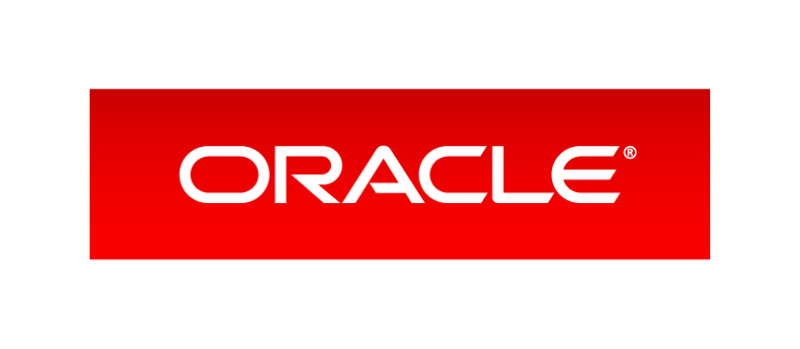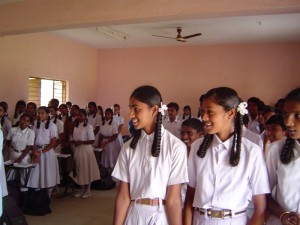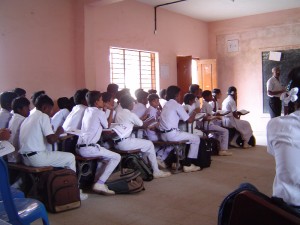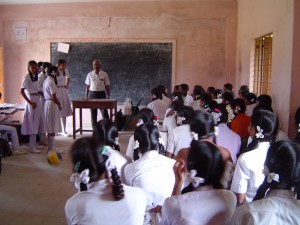Neelamma’s parents put their heart and soul into her education. Illiterate themselves, every step of their daughter’s journey was fraught with the anxiety and uncertainty of an unfamiliar world. Year after year they scraped together money from long days of physical labor, providing the few precious things they could, mute spectators of her schooling. They wanted one thing, that her life should be different from theirs. Finally, the magical culmination they dreamed of happened – she passed SSLC, finishing high school.
Then she goes to an interview, as a first step to a different world – perhaps to a college, or a vocational institute, or a job.
“What is 1/100?” she is asked at the interview. Neelamma is struck dumb. She racks her brains trying to remember – was this question in the guide book? She can’t remember. She mumbles, and the interviewer asks her to speak up. She is silent, thinking hard, not sure what to say or do. The interview ends.
Sometimes just having a teacher in the class causes such excitement
Classrooms are full. Students want to learn.
This is the state of education in many schools in India today. Compared to just a decade ago, children are going to school in huge numbers, with curious minds and highly motivated parents. At the end of schooling, their curiosity crushed, they have become automatons who memorize and repeat. Learning gets equated to perfect recall. They learn by the famed “copy method” – copying lines from the textbook to their notebook. They emerge from schools lacking almost all the skills schools are expected to provide. They have not learnt how to reason, how to think critically, how to look at a problem scientifically.
The situation is particularly serious in government schools. 70% of children go to government schools, girls outnumbering boys in many. It is the only option in rural areas. The system is caught in a cycle of memorization and regurgitation, by teachers and students alike. Every year we lose curious and agile minds to the mindless world of memorization. There are other issues also – lack of resources, teacher vacancies for entire years with a handful of teachers left struggling to cope, and growing class sizes and growing administrative work for teachers. It is a broken system, that today produces students who pass SSLC but with huge gaps in their understanding, particularly in Science and Maths. Education becomes a mere certificate, without the social mobility it can bring because they learn nothing they can use.
The question is not any more ‘can this child go to school?’ The question is ‘what will this child learn at school?’
Asha for Education (Asha) is proud to be selected as an Oracle partner to improve Science and Math teaching in government schools in India. In June 2015 Oracle granted Asha and two project partners $100,000 to expand on three innovative initiatives to improve Science and Math education in government schools in three regions in India. It is a tough challenge, but with the help of the grant Asha will be able to implement some innovative initiatives, developed after years of experience working with government schools.
Asha is not the first organization to try to solve this problem. Various interventions to improve government schools have not been successful, as they do not address the systemic issues in the schools and lead to short-lived impact. In particular, there have been innumerable government and non-government training programs for teachers, but few have had any impact on quality of education. Asha’s goal is permanent change in the schools.
A central aspect of Asha’s initiative is to create processes to mentally and culturally break the use of memorization as a ‘learning’ tool. This requires a multi-pronged initiative. First and foremost, teachers should believe that real learning goes much further than rote learning for exams, breaking the cycle of teachers following the same methods they used when they were in school, namely memorization. This is sometimes as simple as helping teachers experience the thrill of unraveling a complex concept. When the cycle is broken and learning becomes exciting teachers can automatically bring the same excitement to the classroom. Teachers also need access to books, laboratory equipment, teaching materials and a network with other teachers with similar challenges. Most importantly, teachers have to feel they can be successful, instead of giving in to the apathy caused by the challenges. Teacher attitudes change very rapidly with an approach that understands the teachers’ point of view. Rather than the typical top-down approach, Asha first wins the support of teachers and then works with them as partners.
“Many projects have attempted to enable teachers,” says Melli Annamalai, former president of Asha for Education. “Our difference is we work with teachers as equal partners, instead of treating them as mute recipients of training, as so many training programs do. When the teachers’ natural enthusiasm and curiosity is encouraged they become phenomenal agents of change.”
These approaches have shown success in pilot projects. Oracle’s grant comes at a crucial time to expand and scale these projects. In H.D. Kote taluk, the project expands to include all higher primary schools in a majority of clusters in the taluk (a unit within a district), covering a total of 91 higher primary and high schools, reaching 18000 children. Read more about this project here.
In Chamarajanagar the project expands to all higher primary schools in four blocks in the district, directly engaging with 160 teachers and aiming for a ripple effect to reach 900+ teachers, helping thousands of children. The project also plans to build a Science park for students from surrounding villages to visit and expects 5000-6000 children to visit each year. Read more about this project here.
In Thiruvallur district in Tamil Nadu the project brings in technology to create models that will scale. Each project implementation is tailored to the needs of the local schools and communities. We hope to create a blue print for effective improvement of government schools. More details here.
Heart felt thanks to Oracle for helping us towards the goal of providing access to quality education to all.




